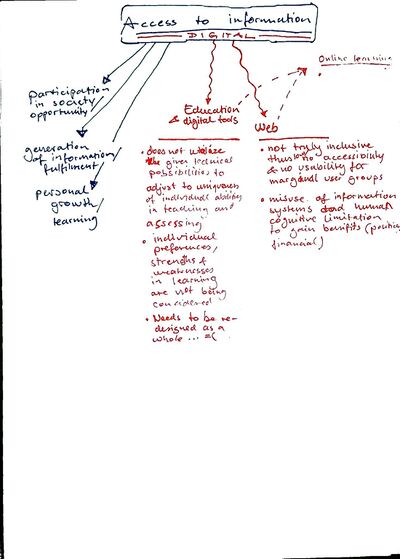User:Max Lehmann/MA Draft 29Sept
Equal access to information is an urgent necessity to provide individuals with equal access to personal growth, fulfillment, opportunity and thus participation in society. In my first analysis of this matter I have found most interfaces on the Internet do not provide equal access to information for some individuals, sometimes even purposely utilizing access to information in order to gain (political, financial) benefits, thus resulting in epistemic inequality/ violence. Individuality matters and no one is average, whereas in the development of digital (mainstream) informational infrastructure it seem the „average man“ is still predominant. I want to further analyze these issues, their consequences for individuals and propose a better way of incorporating also marginalized user groups into the design and development process.
Just as the design practice of „ergonomics“, which makes products equally available for a broad variety of individual as an oppose to a „one-fits-all“ solution, there is a need for omnipresent, easy adjustability throughout digital information distribution systems, which I call „cognitive ergonomics“. This concerns: ⁃ so-called „Inclusiveness-, accessibility and (concluding from this) Usability-Standards of the web, which are at best integrative. (Segregative: all different parts of a system are being treated differently. Integrative: the majority (equal parts) integrates a few parts with differences into their group and integrates them, which means the unequal parts will over time adjust to the group. Inclusive: All different parts of a system are being treated equally and contribute to the system, while profiting of the systems diversity.)These well-meant standards put users second, that do not correspond or at least come close to the average, as they are the ones having to go through an extra effort of adjustment in order to gain access. If the web would be truly inclusive that would mean, that everybody had to go through steps of adjustment, which can also be of benefit to people with „average sets of abilities“. ⁃ methods, that utilize human cognitive limitations to gain financial or political benefits, like abusing human biases to gain more political influence through targeted advertising or financial benefits through biased marketing, as well as deliberately exceeding the capacities of human cognitive processing abilities to exclude users from understanding e.g. the terms and conditions of services or algorithmic predictions of their behavior. ⁃ the educational system, which is still referring to an „average student“ when generating, providing informational content and assessing the students, whereas they are not utilizing as they should be the technical possibilities of digital supportive tools and online learning to facilitate a more individualistic approach to learning that adjusts itself to the students individual strengths, weaknesses, preferences and pace.
I want to develop a website/web-app, that tries to extend the limits of the technical and social framework of the web by experimenting with an interface, that adjusts itself as much as possible to a users abilities and preferences. This experiment aims to find out to what extent it is functional to design interfaces in such a way that all users, even those who differ significantly from the average, have equally easy and pleasant access to information.
For this I want to work individually, conduct field studies and at best find a constant test group. I will look into the concepts of Inclusion and Inclusive-Design, Ergonomics, Inclusive-/ Accessible-Web Standards, the Principals of Individuality, as well as Epistemic inequality & Epistemic violence. For the practical part I want to a make use of Webdesign, coding (HTML, CSS, JS), Wikimedia & Wiki_To_Html, 2D animation.
I want to collect the generated user data and use it to survey in which way users adjust a web-interface if they have the chance to. Maybe there will also be a gallery showcasing all previously generated versions.

